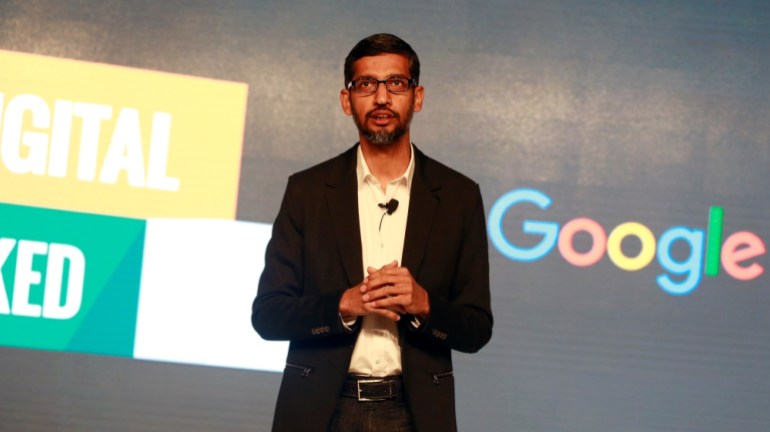
Carlin Putman, of Houston, Texas, worked at AIG for more than two decades. She lost her job at the beginning of the year. She was devastated.
But the signs were unrecognizable for months as the company tried to cut costs.
“No matter how much work we had, we were working bare bones,” Putman told Al Jazeera English.
Late last year, the insurance giant announced it would lay off hundreds of employees, including Putman.
“When you report to the board, the fewer employees you can prove, the better it looks to them,” Putman said.
In 2022, AIG’s Peter Zaffino was the highest paid CEO in the entire property and casualty insurance sector. Last year he earned more than $75 million – most of which came from stock awards.
According to research firm Equilar, this is the case Zaffino the third highest paid CEO in all of America based on sales.
AIG has not publicly committed to requiring its top executives to take any pay cuts as a result of the layoffs. AIG did not respond to Al Jazeera’s request for comment.
AIG has not yet released its proxy statement – the document a company releases when it solicits shareholder votes ahead of an annual meeting and which includes executive compensation for the year. AIG’s last came in March. Like most listed companies, it will make its next issuance in the first half of 2024.
Other companies responded to Al Jazeera’s queries but said executive compensation had not yet been disclosed. T-Mobile, for example, announced that it would release the details of CEO Mike Sievert’s compensation package in April, as did Pfizer, Morgan Stanley, Ford, GoDaddy and many others.
While corporate America moved quickly with layoffs, the consensus on executive pay has yet to be determined, suggesting it could rise. That sends a mixed message about the state of the economy ahead of the 2024 presidential election.
High layoffs amid record job growth
In January, Salesforce laid off people 10 percent its workforce. CEO Marc Benioff blamed economic conditions.
The layoffs came despite record job growth in the United States. In 2022, the US economy added 4.5 million jobs – the second highest in 40 years. Excluding this month, for which data is not yet available, the economy added more than 2.5 million jobs in 2023.
In October, the White House announced that inflation had slowed by 60 percent since its peak in June 2022.
At the same time, Salesforce reported revenue of $8.2 billion in the first quarter.
“CEOs are often rewarded for firings because Wall Street sees this as a sign that the CEO is taking the tough measures to ensure the company stays mean and lean, so there is often a rise in the stock price after a firing.” Sarah Anderson, director of the Global Economy Project at the Institute For Policy Studies, told Al Jazeera.
“In such a context, shareholders will definitely not demand the CEO’s leadership position or even cut their bonuses because shareholders are happy when the share price rises,” she added.
In a letter to employees, Benioff said, in part: “We hired too many people, which led to this economic downturn we are now facing, and I take responsibility for that.”
Still, analysts like Wedbush’s Dan Ives called Salesforce’s first Q1 results a “masterpiece.” Marc Benioff made the rounds on business news television to promote his earnings report and was rarely asked about the massive job cuts, even though Benioff’s salary rose 4 percent in 2022 Equivalent data.
Salesforce has added more than 3,000 jobs since the recent cuts. Benioff did not commit to a pay cut. Salesforce did not respond to Al Jazeera’s request for comment.
Despite tailwinds in the U.S. economy over the past two years, there have been more than 260,000 layoffs in the industry, according to Layoffs.fyi — a platform that tracks layoffs in the tech industry.
According to a report by Challenger, Gray and Christmas, there were about 20,000 redundancies in the media industry in 2023. The same report found that retail lost 78,000 jobs and healthcare lost about 57,000 jobs.
Pay cuts are not always noble

Although thousands have lost their jobs this year, senior executives rarely take any pay cuts. Al Jazeera examined more than 90 companies across various industries to find out who decided to take a public pay cut last year.
Several companies announced that their CEOs would take pay cuts. In February, Twillio announced that its CEO Jeff Lawson would take a nearly 50 percent pay cut. Micron Tech announced that its CEO would take a pay cut of around 20 percent. David Solomon of Goldman Sachs also announced a pay cut. Alphabet’s Sundar Pichai said he won’t receive a bonus this year.
How meaningful these are varies. Pichai’s announcement, for example, comes only after a huge salary increase for 2022. According to Equilar, that was an increase of 3,474 percent compared to the previous year.
The most notable cut occurred at Zoom Communications. Its CEO, Eric Yuan, made headlines earlier this year after announcing he would take a 98 percent pay cut due to layoffs at the videoconferencing giant that made the program increasingly popular in everyday life during the COVID-19 pandemic would. He took responsibility for the overstaffing.
It is not always easy for executives to take pay cuts as they can make the company appear weak and therefore impact the stock price. Generally, listed companies are committed to their shareholders through what is known as a concept Shareholder supremacy And companies can be sued when executives make decisions that are not in the best interests of their shareholders.
But pay cuts aren’t always as black and white as PR campaigns suggest.
For example, Intel said it would “temporarily reduce base salaries for our CEO and NEOs by 25% and 15%, respectively, with target bonuses for 2023 based on the new blended salaries (certain months at previous salary and certain months at reduced salary),” in its most recent proxy statement.
However, experts have pointed out that this is not always as noble as it seems.
“Where they [CEOs more broadly] We have to understand that we are making cuts. When they take salary cuts, that’s really the biggest thing, it’s just the most obvious thing that people see,” Harikumar Sankaran, a professor of finance at New Mexico State University, told Al Jazeera.
In Intel’s case, the tech giant cut cash bonuses to its CEO Pat Gelsinger. However, the Silicon Valley-based tech giant has increased the role of its shares in its executive compensation package.
“Many executives announced with great fanfare that they would not be taking a salary, but when we looked at total compensation, it was the same as the year before,” Anderson said.
“It is only better than nothing if the total compensation is significantly reduced. If it’s just a small cut in base salary, they will behave like bandits with their stock-based salary.”
According to the company’s most recent proxy, the CEO’s compensation was over $11.6 million, of which $8.8 million came from stock awards.
Intel has also realigned its compensation commitment to focus more on “at-risk” compensation. The proxy statement argued that this will “strengthen our performance-based compensation, enable further alignment with the long-term interests of shareholders and meet our company’s cost reduction needs given the ongoing macroeconomic headwinds we face.”
“If companies said they would not accept stock awards for the next two years, that would be a significant statement,” Sankaran said.
However, the CEOs’ decision to compensate themselves ultimately does not change the increasingly tense financial situation of the hundreds of thousands of American workers who have lost their jobs this year.






Recent Comments